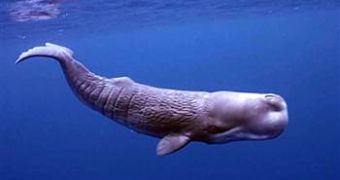There is little denying that a sperm whale's ability to spend up to 90 minutes underwater without ever feeling the need to surface for a breath of fresh air is amazing, to say the least.
An international team of researchers now claims to have figured out how it is that sperm whales can survive despite their being deprived of oxygen for about an hour and a half.
The scientists are convinced that the answer lies in the makeup of these marine mammals' blood.
Their investigations have revealed that, unlike the blood of other animals, the one flowing through a sperm whale's vessels contains a special protein.
This protein allows the animal to store significantly more oxygen than other creatures can and then use it to keep itself alive underwater, Daily Mail reports.
The protein biologists at the University of Manitoba and at the University of Liverpool are talking about is known to the scientific community as myoglobin.
This particular protein can also be found in the blood of other animals, yet it behaves somewhat differently when present in the bodies of champion divers.
Thus, the protein reportedly becomes charged and this, in turn, translates into an increased ability to store oxygen.
“We studied the electrical charge on the surface of myoglobin and found that it increased in mammals that can dive underwater for long periods of time,” Dr. Michael Berenbrink said, as cited on the official website for the University of Liverpool.
Dr. Scott Mirceta detailed on these findings, and explained as follows:
“Our study suggests that the increased electrical charge of myoglobin in mammals that have high concentrations of this protein causes electro-repulsion, like similar poles of two magnets.”
“This should prevent the proteins from sticking together and allow much higher concentrations of the oxygen-storing myoglobin in the muscles of these divers.”
A detailed account of this investigation and its findings was published in a recent issue of the journal Science.

 14 DAY TRIAL //
14 DAY TRIAL //